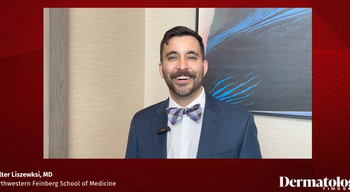
Sofia Wenzler, PhD, highlights the vital role dermatologists play in treating body-focused repetitive behaviors like skin picking and hair pulling.

Sofia Wenzler, PhD, highlights the vital role dermatologists play in treating body-focused repetitive behaviors like skin picking and hair pulling.

Vimal Prajapati, MD, FRCPC, DABD, highlighted key findings from the THRIVE-AA trials, noting the efficacy of deuruxolitinib 8 mg BID, its favorable safety profile, and its positioning alongside other JAK inhibitors.

Panelists discuss how evolving concerns about long-term topical corticosteroid use are prompting a shift toward safer, nonsteroidal alternatives such as roflumilast, emphasizing structured treatment plans, early patient education, and improved office workflows to support individualized, steroid-sparing psoriasis care that enhances both outcomes and trust.

Vimal Prajapati, MD, FRCPC, DABD, reviews the mechanism of action, clinical trial outcomes, monitoring considerations, and safety profile of recently available deuruxolitinib.

Sofia Wenzler, PhD, addresses misconceptions about dermatillomania (skin picking) and trichotillomania (hair pulling), advocating for compassionate care and accessible treatment for BFRBs.

A panelist highlights the evolution of seborrheic dermatitis treatment from traditional antifungals and corticosteroids to newer nonsteroidal options such as phosphodiesterase-4 (PDE4) inhibitors, emphasizing the importance of aligning therapy with patient preferences, lifestyle factors, and long-term disease management needs to improve adherence and outcomes.

Renata Block, DMSc, MMS, PA-C, and Isabelle Thibau, MPH, of the National Eczema Association discuss how the EczemaWise app integrates patient-reported outcomes, validated tools, and real-world data to improve collaboration between patients and clinicians in managing eczema.

Discover the latest in regenerative aesthetics and body contouring at DERM 2025, featuring insights from Suneel Chilukuri, MD, on skin care trends and biohacking.

Panelists discuss how the availability of both roflumilast foam and cream allows for personalized, preference-driven treatment plans that enhance adherence while streamlined access strategies and improved topical efficacy are reshaping the role of nonsteroidal agents in psoriasis care, extending their use beyond mild disease to special sites and even as systemic-sparing options.

GLP-1 receptor agonists may indirectly affect dermatologic outcomes by targeting inflammation and metabolic comorbidities.

Members of Elevate-Derm Alliance and the SkinSync podcast discuss the inspiration behind the podcast and how it best serves dermatology clinicians.

Lisa Swanson, MD, FAAD, shares innovative insights on pediatric dermatology, emphasizing effective treatments and communication strategies for young patients at DERM 2025.

An expert discusses how insurance limitations hinder access to newer, more effective acne treatments, emphasizing the need for long-term cost-benefit recognition, while also highlighting the ongoing role of oral antibiotics and the importance of personalized care—especially for adult women with distinct acne profiles.

An expert discusses recent innovations in acne treatment—including the first narrow-spectrum oral antibiotic, an advanced triple-combination topical, and emerging procedural options—highlighting their roles in personalized care, antibiotic stewardship, and achieving long-term therapeutic success.

Case reports showed encouraging outcomes in eczema, but the company is pursuing deeper validation.

Discover how biologic coordinators streamline dermatologic care through detailed protocols, clinical documentation, and patient advocacy to improve access to life-changing biologic therapies.

A panelist discusses the diverse clinical presentation and complex pathophysiology of seborrheic dermatitis, emphasizing the need for individualized, location-specific treatment strategies and highlighting how emerging therapies may help address overlapping features with other chronic inflammatory skin conditions.

April Martinez-Dulay, MSN, APRN, FNP-BC, shares insights on diagnosing and treating types of dermatitis at DERM 2025, emphasizing innovative approaches and patient care strategies.

Walter Liszewski, MD, shares expert strategies for managing body surface area limitations in AD treatment using non-steroidal topicals, and explored key unmet needs in the current therapeutic landscape.

Strong mentorship provides resilience for young clinicians navigating evolving challenges in practice.

James Song, MD, FAAD, reveals insights on abrocitinib's safety in atopic dermatitis, highlighting lower conjunctivitis rates compared to dupilumab at DERM 2025.

Panelists discuss how roflumilast foam, though newly approved for scalp psoriasis, is already showing promise off-label for conditions such as seborrheic dermatitis and nail psoriasis, thanks to its well-tolerated, alcohol- and propylene glycol–free vehicle that improves patient comfort, adherence, and expands topical options for difficult-to-treat areas—potentially reducing reliance on systemic therapies.

At DERM 2025, David Cotter, MD, PhD, shared how GEP testing revolutionizes skin cancer management and enhances patient care at the forefront of dermatology innovation.

An expert discusses the preference for narrow-spectrum oral antibiotics in acne treatment due to their favorable safety profile, emphasizing a short-term, combination approach aligned with stewardship principles and the need to balance clinical effectiveness, patient preferences, and access challenges.

An expert discusses the importance of setting clear treatment timelines and goals for oral antibiotics in acne, emphasizing a short-term, combination approach with topicals, careful antibiotic selection based on adverse effects and spectrum, and the benefits of narrow-spectrum agents to support stewardship and patient adherence.

At the Elevate-Derm Summer 2025 meeting, Walter Liszewksi, MD, discussed how new topical therapies, particularly JAK inhibitors, are transforming AD care with rapid itch relief, effectiveness in complex cases, and patient-friendly formulations for sensitive areas.

Dr. Rossi DERM MD blends dermatologic science with K-beauty aesthetics for effective, evidence-based solutions.

Discover Anthony Rossi, MD, FAAD, FACMS's innovative skin care line targeting inflammatory aging with clinical science, clean formulations, and effective anti-aging solutions.

A recent HS Summit hosted by UCB brought together clinicians and patient advocates to strengthen research and awareness efforts.

Walter Liszewski, MD, discusses the personalized and evolving treatment landscape for moderate to severe AD, emphasizing a tailored approach using new biologics and non-steroidal topicals to meet individual patient needs and expectations.